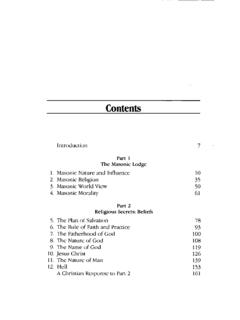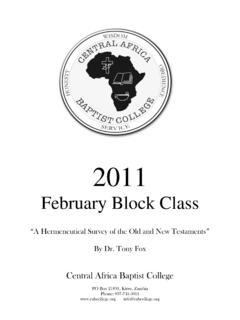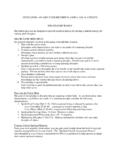Transcription of Christian Education: Foundation for the Future
1 Contents Preface Part 1: The Definitive Nature of Christian Education i. What Christian Education Is-Kenneth D. Gangel 2. Establishing biblical Foundations-Edward L. Hayes 3. Reviewing Historical Foundations-Wayne A. Widder 4. Developing a Philosophy-James C. Wilhoit 5. Trends: Waves of the Future -Wesley R. Willis . Part 2: The Teaching-Learning Process in Christian Education 9 13 31 43 57 71 6. Christ the Master Teacher-Warren S. Benson' 87 7. Teaching for Learning-Lynn Gannett 105 8. The Holy Spirit in Education-C~ Fred Dickason 121 9. The Teacher: Facilitator for Ch~nge-Dennis H.
2 Dirks i37 10. biblical Feeding for Leading-:-Irving L. Jensen 157 11. Planning for Teaching and Learning-Larry Richards with Lin Johnson 171 12. Managing the Classroom Experience-Michael S. Lawson 179 13. Teaching and Learning Strategies-Robert J. Choun, Jr. 193 14. Instructional Media and Learning-C. Keith Mee 203 Part 3: The Ministry Is to Pf!Ople 15. Infants and Preschoolers-Valerie A. Wilson 221 16. Elementary-Age Chiidren~Robert 233 17. Junior and Senior Highers-Pamela T. and Stanton D. Campbell 249 18. Adults: An Introduction-Perry G. Downs 263 19. Young, Middle, and Senior Adults-Brian C.
3 Richardson, Stanley S. Olsen, and Allyn K. Sloat 275 29. Single Adults: One Is a Whole Number-Carolyn A. Koons 301 21. Exceptional Persons-Julie A. Hight 319 22. Understanding Learning Styles-Marlene leFever 333 23. World Christian Education-James E. Plueddemann 351 24. Ministering. to Major Cultural GrouPs-Colleen Birchett, Marta Alvarado, and Johng Ook Lee' 367 Part 4: The Church's Strategies for Christian Education 25. The Church's Educational Ministry-Doris A. Freese with J. Omar Brubaker 395 26. The Pastor's Educational Ministry-Donald M. Geiger 411 27.
4 Professional Church Leadership-Ray Syrstad 427 28. The Board of Christian Education-Dennis E. Williams 443 29. Evaluation and l.,ong-Range Planning-Harold J. Westing 455 30. Principles of Leadership Recruitment-Mark H. Senter III 469 31. Equipping the Educational Staff~Richard Patterson 481 32. Understanding and Using Curriculum-Lin Johnson 495 33. Dynamics of Small Group Ministries-Julie Gorman 507 34. Utilizing Computer Support-Lowell Brown and Wesley Haystead 525 35. Facilities and Equipment for Education-Lowell Brown and Wesley Haystead 539 Part 5: The Church's Allies for ~hristian Education 36.
5 biblical Perspective for the Family-James R. Slaughter 37. Building Healthy Families~Wayne Rickerson 38. Spiritual Formation in the Home~raig Williford 39. Public, Christian , and Home Schooling-Cliff S~himmels 40. Parachurch Educational Organizations-Robert A Barron General index ' .. 555 569 583 597 611 629 1 What Christian Education Is DEFINING biblical Christian EDUCATION Kenneth o. Gangel Recognizes the family-centeredness of Christian nurture throughout Scripture Reaffirms the centrality of biblical revelation in the educative process Reviews the example of Jesus as teacher, mentor.
6 And leader Rekindles the dynamic role of the Holy Spirit in the leaching-learning process Responds to the Great Commission by balancing evangelism and edi-fication ministry Refocuses on education for spiritual growth-producing mature dis-ciples Thomas Talbott once ruminated over the idea that God may have called him to be a teacher in order to show him how biblical revelation had been formed. Talbott suggests that the way teachers struggle and study to communicate truth to their classes offers a microscopic metaphor of how God revealed His truth throughout the centuries.
7 His appropriate title simply affirms ''What Teaching Can Teach Us About Scripture.'" 1. Thomas Talbott. "What Teaching Can Teach Us About Scripture," Reformed lournal36:9 (September 1986): II. KENNETH O. CANCEL, , is department chairman and professor of Christian education, Dallas Theological Seminary, Dallas, Texas. 14 Christian EducatioN Foundations (or the Future In this chapter we will strive to reverse Talbott's idea and-indeed-his title. Our concern at the beginning of this important book is to ask ''What can Scripture teach us about teaching?" Or more broadly, "What can Scripture teach us about the nature and role of Christian education among evangelicals?)
8 " Christian education has been diversely defined over the past half century. In 1963 Randolph Crump Miller commended a simple definition by Adelaide Case: " Christian education is the effort to make available for our generation-ehildren, young people, and adults-the accumulated treasures of Christian life and thought, in such a way that God in Christ may carry on his redemptive work in each human soul and in the common life of More recently, Mark Lamport observed that the primary difference between sec-ular education and Christian education is the adjectival descriptor Christian .
9 "To be Christian , Christian education must: have God's esteem for the human being, sense the task to be a whole-life experience of growth and maturity, and give opportunity for service through experiential action.'" What seems obvious from both of the above definitions (and from numerous other contributions by evangelical educators) is the absolute link between Christian education and theology. In this respect we refer to Christian education rather than religious education. The distinction falls not between New Covenant and Old Covenant truth, for evangelicals affirm the Old Testament base for Christian education.
10 But the difference comes in articulating an education distinctly based upon theological propositions derived from the text of Scripture rather than education developed to perpetuate and propagate the tenets of a designated reli-gious system. To be sure, Christian education owes a great debt to the social sciences-and in the framework of a secular university, that would be its normal home. But a sec-ular university cannot provide the natural habitat for Christian education; its absolute link to Scripture pushes the social sciences to step-child status. Perhaps one of the best recent discussions of this linkage was prepared by Jim Wilhoit in Christian Education and the Search for Meaning.









